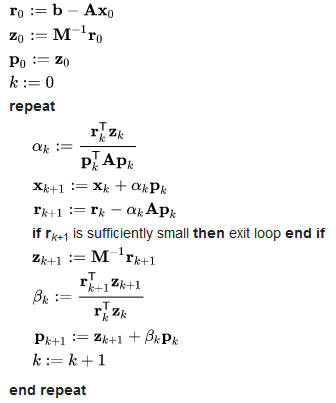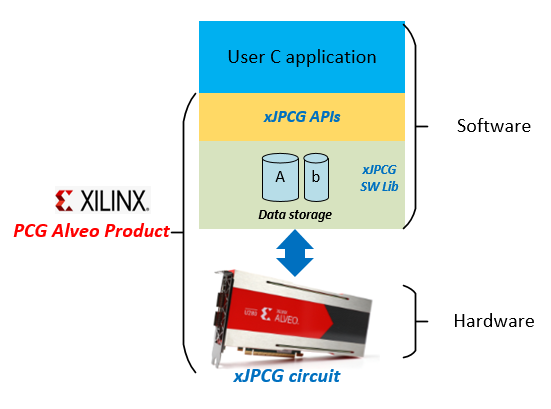Xilinx® Alveo™ HPC Products¶
PCG Alveo Product¶
Engineering simulation software allows product engineers to predict the physical characteristics of products under development with greater accuracy, and as a result, to deliver high quality products with a much shorter development cycle. One of the key components in those engineering simulation applications is a set of numerical solvers. The PCG (Preconditioned Conjugate Gradient) solver is a well-known method for solving large sparse linear systems. The solver is widely used in the following simulation systems.
- Structural mechanics simulation
- Thermal analysis
- Dynamic fluid simulation
To be more precise, the PCG method is used to solve a large sparse linear system Ax=b for vector x, where A is a symmetric positive definite matrix.
The Xilinx® PCG Alveo™ Product provides a hardware-accelerated PCG solver for use with a Xilinx Alveo U280 accelerator card. Particularly when the density of matrix A is less than 10% or each dimension of matrix A is more than a half million, the PCG Alveo Product can greatly boost the speed of your PCG computations relative to alternative PCG solver implementations.
FPGA Accelerated JPCG Solver¶
The algorithm below describes a PCG solver with a Jacobi preconditioner, referred to as “JPCG” in PCG Alveo Product documentation.

Algorithm source: https://en.wikipedia.org/wiki/Conjugate_gradient_method#The_preconditioned_conjugate_gradient_method
The Xilinx® PCG Alveo Product consists of a software component, supplied as a shared library (.so file), and a hardware component, supplied as an Alveo card program file (XCLBIN file). The shared library links with your C application, and the XCLBIN file loads onto the Alveo accelerator card.
As shown in the diagram below, the shared library consists of a set of C API functions, labeled as “xJPCG APIs,” and their underlying software implementation, labeled as “xJPCG SW Lib.” The XCLBIN file installs the hardware-based PCG solver, labeled as “xJPCG ciruit,” into the Alveo card.
Your C application calls the API functions, providing matrix A, vector b, and other parameters. The software library stores matrix A and vector b in CPU memory for reuse in future API calls before sending them on to the PCG solver in the Alveo card. When the computation has completed, the library returns solution vector x from the Alveo card to your application.
Run JPCG on the Alveo U280 Accelerator Card¶
The Xilinx® Alveo™ U280 Data Center accelerator cards provide optimized acceleration across a wide range of workloads. Designed for deployment in any server, the Alveo U280 accelerator card has the following features:
- Built on Xilinx UltraScale+ architecture
- Small power consumption footprint, maximum 225W
- 100 Gbps networking I/O
- PCIe Gen4
- HBM
The PCG Alveo Product includes an example application to demonstrate how to integrate the hardware-accelerated PCG solver into your own application.
